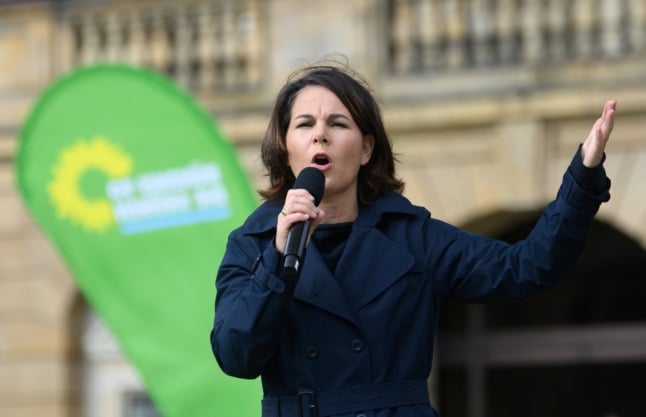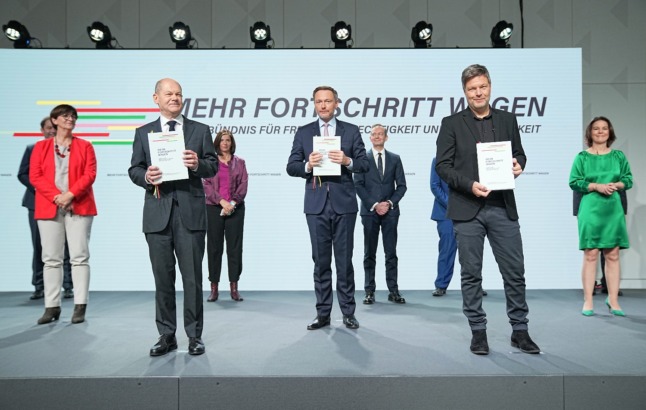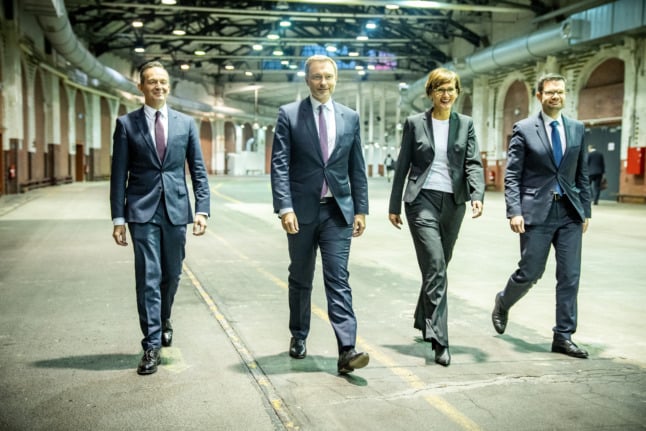What’s the big picture on polls?
With just over a week until to the election, polls remain stable.
According to the ZDF Politbarometer, the SPD can count on an unchanged 25 percent of voters – three percentage points more than the CDU/CSU which scooped up 22 percent. But 38 percent of voters have not yet made up their minds.
According to the poll, the Greens lost one percentage point from the previous poll, falling to 16 percent.
There was no movement among the other parties. The Free Democrats (FDP) and Alternative for Germany (AfD) remain at 11 percent, the Left Party at six percent.
READ ALSO: What an SPD-led coalition could. mean for foreigners in Germany
BUNDESTAGSWAHL | Sonntagsfrage Forschungsgruppe Wahlen/ZDF
SPD: 25%
Union: 22%
GRÜNE: 16% (-1)
AfD: 11%
FDP: 11%
LINKE: 6%
Sonstige: 9% (+1)Änderungen zur letzten Umfrage vom 10. September 2021
Verlauf: https://t.co/hsxgiA6QD4#btw #btw21 #BTWahl2021 pic.twitter.com/CXzB9M2MNc
— Deutschland Wählt (@Wahlen_DE) September 17, 2021
When it comes to the three chancellor candidates, the SPD’s Olaf Scholz continues to be on the minds of German voters. According to the Politbarometer, 67 percent of respondents believe he is capable of holding office. The CDU/CSU candidate Armin Laschet is considered by only 29 percent to be capable of becoming chancellor. The Green Party’s Annalena Baerbock scores 26 percent.
Just under half – 48 percent – would prefer Scholz as chancellor. Laschet would be preferred by 22 percent, and Annalena Baerbock by 15 percent.
State polls also hotting up
It’s not just the federal election taking place next Sunday, it’s also voting day in the states of Berlin and Mecklenburg-Western Pomerania.
In Berlin, the polls are close. A new survey on the state elections in the capital shows the SPD with 21 percent, the Greens with 20 percent and the CDU with 17 percent. One of the biggest issues in Berlin include the housing crisis. On the same day, a referendum calling on the state to expropriate homes from big landlords is also taking place. The SPD – with its top candidate Franziska Giffey – has spoken out against expropriation.
EXPLAINED: Berlin’s super election day
Berlin’s election is getting close! Has Giffey’s position against Enteignung given the Greens a second wind? https://t.co/rS9jNWr5E4
— James Jackson (@derJamesJackson) September 17, 2021
‘Stop hunger strike’
The Greens co-leader and chancellor candidate Annalena Baerbock urged climate activists to end their hunger strike during an election campaign rally in Chemnitz Friday. She said hunger strikes are the “wrong way of dialogue”, saying the activists were endangering themselves.
An audience member had asked why she did not respond to the hunger strikers’ request to talk. Baerbock said she had spoken to them on the phone and discussed issues of climate policy. Some people at the rally held placards with messages like: “Talk to the hungry!”
The climate activists in Berlin began their hunger strike on August 30th with the aim of securing a public discussion with the three chancellor candidates.
READ ALSO: ‘Last resort’: Berlin activists go on hunger strike for climate
Coalition cat fights
Two smaller parties – the Free Democrats (FDP) and Die Linke (the Left Party) – have been in the German media a lot over the past days. That’s because these parties are scouting out a possible spot in a future coalition – on their terms, of course.
On Friday. Left Party chair Susanne Hennig-Wellsow reacted to a statement by FDP leader Christian Lindner, who told Bild that in a constellation “where there are several parties, each must of course be able to contribute”. This had been interpreted Lindner wanting to see several vice chancellors after the elections.
Hennig-Wellsow picked up on the statement and told Spiegel: “Mr. Lindner wants two vice chancellors because he would like to be one of them. I want affordable housing, good wages in east and west, and higher pensions so that no one has to be afraid of getting old anymore.”
However, Lindner hit back again saying his statement was not about obtaining titles.
Oh how we love it when parties swipe at each other.
Merkel voting by post
There will be no photos of the Chancellor at the polling station next Sunday, September 26th. Angela Merkel has decided to make use of the postal voting option in this election, government spokesman Steffen Seibert said in Berlin on Friday. He didn’t reveal whether the Chancellor has already cast her vote.




 Please whitelist us to continue reading.
Please whitelist us to continue reading.
Member comments